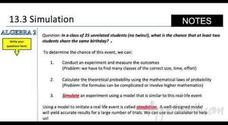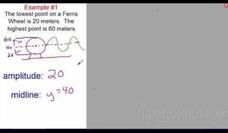Flipped Math
Side Splitter Theorem
Apply perspective to similarity. Individuals learn about the Side Splitter Theorem by looking at perspective drawings. Pupils use the theorem and its corollary to find missing lengths in figures. Next, they practice using the theorem and...
Flipped Math
Prove Triangles Similar
Show more than one way to prove similarity. Scholars learn three different methods to show two triangles are similar, Angle-Angle, Side-Side-Side, and Side-Angle-Side. Pupils practice applying these methods to determine whether two given...
Flipped Math
Similar Figures
Use some similar problems to find side lengths. Pupils learn the definition of similar figures and how it relates to corresponding angles and sides. Using the definition, individuals calculate the lengths of missing sides and practice...
Flipped Math
Unit 3 Review: Parallell and Perpendicular Lines
Learners watch a quick review on the Parallel and Perpendicular Lines unit. The pupils work through ten review problems ranging from identifying types of angles formed by parallel lines and transversals to writing equations of parallel...
Flipped Math
Equations of Lines in the Coordinate Plane
What, you mean there is algebra in a Geometry class? Pupils review graphing and writing the equations of lines in slope-intercept form. The instruction follows the "I do, we do, you do" framework of a lesson. The instructor first...
Flipped Math
Reasoning and Proof
Make sure the conditions are right. Pupils watch a video introducing conditional statements and their related statements. Learners find out how to identify the hypothesis and conclusion as well as write the converse, inverse, and...
Flipped Math
Slopes of Parallel and Perpendicular Lines
Apply slopes and not slipping. Learners discover the relationship between slopes of parallel and perpendicular lines. Individuals use that information to find equations of lines through a given point that is either parallel or...
Flipped Math
Proving Lines Parallel
Show it can all be proved. Scholars learn the converses of the properties of parallel lines. Using the converses, pupils determine which lines are parallel based on angle measurements and practice using a flow proof to show that two...
Flipped Math
Properties of Parallel Lines
Work within a parallel universe. Scholars learn about the relationships of angles when two parallel lines are intersected by a transversal. They see how to find the measurements of all eight angles by knowing the measure of one angle....
Flipped Math
Lines and Angles
Develop a sense of understanding. Pupils learn eight definitions dealing with types of lines and angles formed when two lines are crossed by another line. Learners use the definitions to identify the lines and pairs of angles in figures...
Flipped Math
Unit 2 Review: Reasoning and Proofs
The proof is in the review. Individuals watch a short review of the content from the unit to prepare for the unit exam. The review covers inductive reasoning, conditional and related statements, and two-column algebraic and geometric...
Flipped Math
More with Proofs
Proofs may be as easy as 1, 2, 3 ... maybe. Pupils participate in creating four example proofs. The presentation uses a list of geometric properties to develop the proofs by filling in both the statements and reasons. Scholars practice...
Flipped Math
Intro to Proofs
Prove the best way to keep up in Geometry. Scholars first review algebraic properties from Algebra. Learners then use the properties to create two-column proofs to solve linear equations before completing algebraic proofs by providing...
Flipped Math
Addition Postulate
Add a little algebra to the geometry. Class members learn about the Addition Postulate for segments and angles. The pupils use their knowledge of solving equations to find lengths of segments and measures of angles. Individuals apply...
Flipped Math
Angle Pairs
Complement the class by identifying pairs of angles. With a vocabulary lesson, pupils learn the names and definitions of special angle pairs including adjacent, vertical, complementary, supplementary, and linear pairs. Using the...
Flipped Math
Measuring Angles
An informative presentation shows pupils how to name and measure angles. Scholars revisit the different types of angles and their definitions and use their knowledge of what an angle bisector is to solve algebraic problems. At the end,...
Flipped Math
Points, Lines, and Planes
Geometry is more than just vocabulary. Pupils learn the basic geometric definitions and how to identify and name points, lines, and planes. Though the first lesson is packed with related vocabulary, scholars experience four postulates...
Flipped Math
Simulations
Simulate an exciting graphing calculator-based lesson. Individuals watch and participate creating simulations using the random number generator in a graphing calculator to answer probability problems. Learners then build simulations to...
Flipped Math
Experimental Design
Experimentally, come up with a study design. Learners hear about different types of study designs, observational studies, and experiments. They identify the subjects, response variable, treatment, and whether there was a cause and...
Flipped Math
Sampling Methods
Pupils watch a video to learn about different types of sample design and how to use technology to create a random sample. They discover different types of bias that may happen due to the sampling design or the questions. Learners use...
Flipped Math
Series
Add it all together. Pupils learn how Gauss was able to add the numbers from 1 to 100 so quickly and arrive at a formula to find the sum of a given number of terms of an arithmetic series. Scholars learn the formula to find the sum for a...
Flipped Math
Sequences
To say it explicitly—put the terms in order. Pupils learn about the two main sequences, arithmetic and geometric and discover the general explicit formulas for both types. Using the formulas, learners then calculate specific terms of the...
Flipped Math
Modeling with Trig Functions
Find out what to do with Ferris wheels that keep going up and down. Individuals learn how to determine the frequency of a trigonometric function. Pupils use their knowledge of trigonometric functions to model periodic motions like Ferris...
Flipped Math
Unit Circle and Radians
Measure angles is easy as pi. Pupils review special right triangles to find exact values for trigonometric functions. Scholars learn about radians and how they connect to measurements in degrees. They find exact and approximate values of...

























